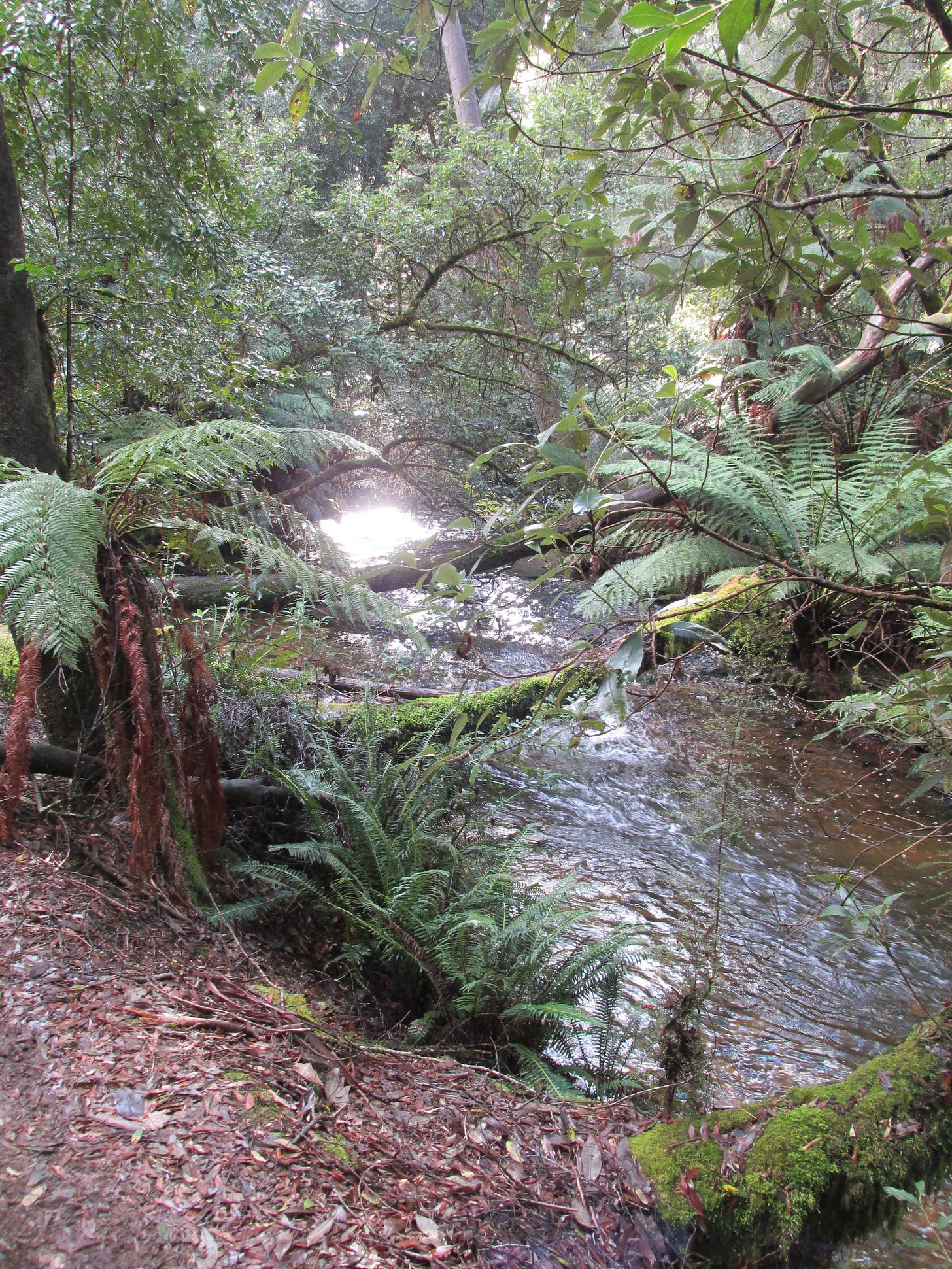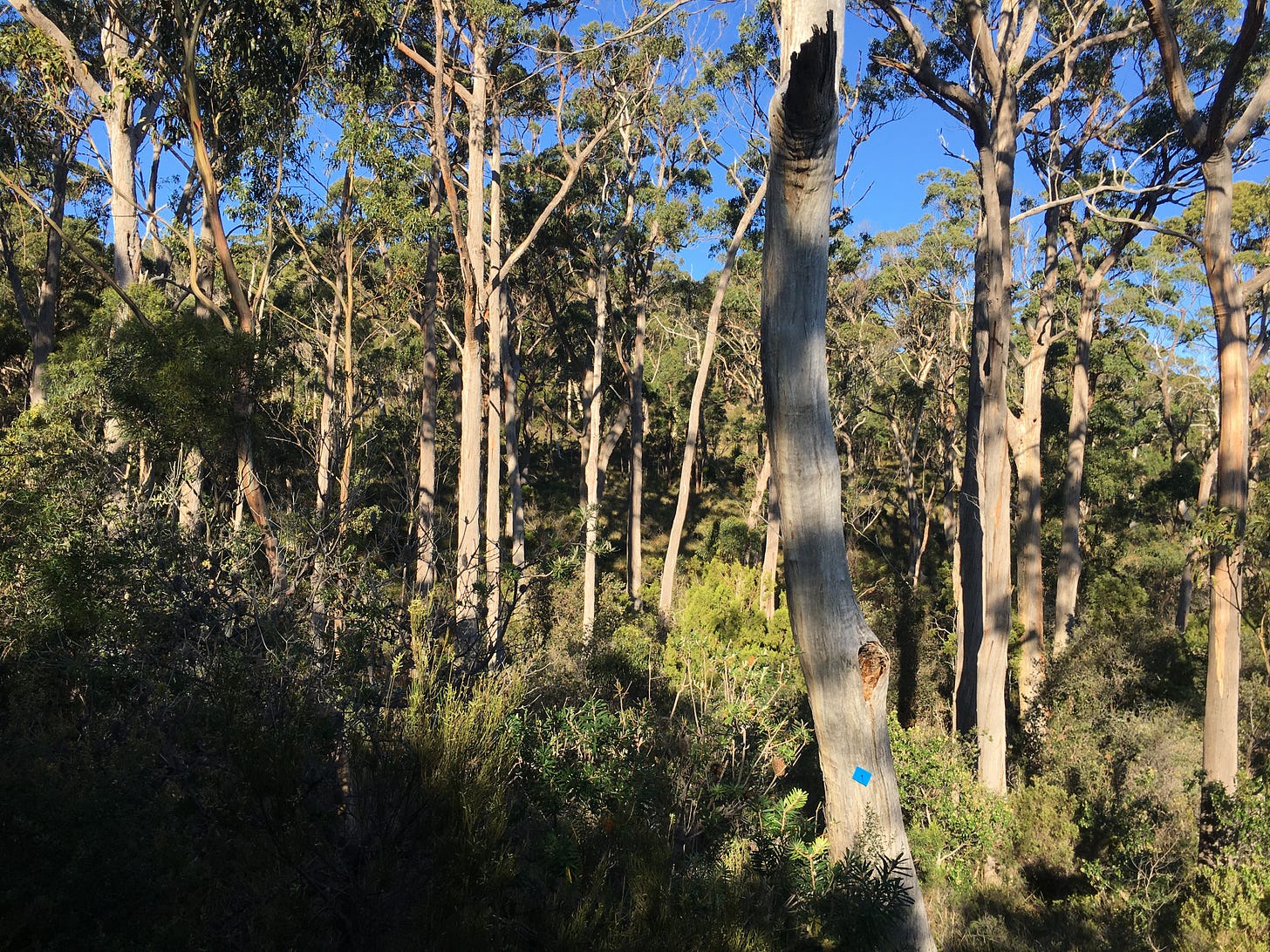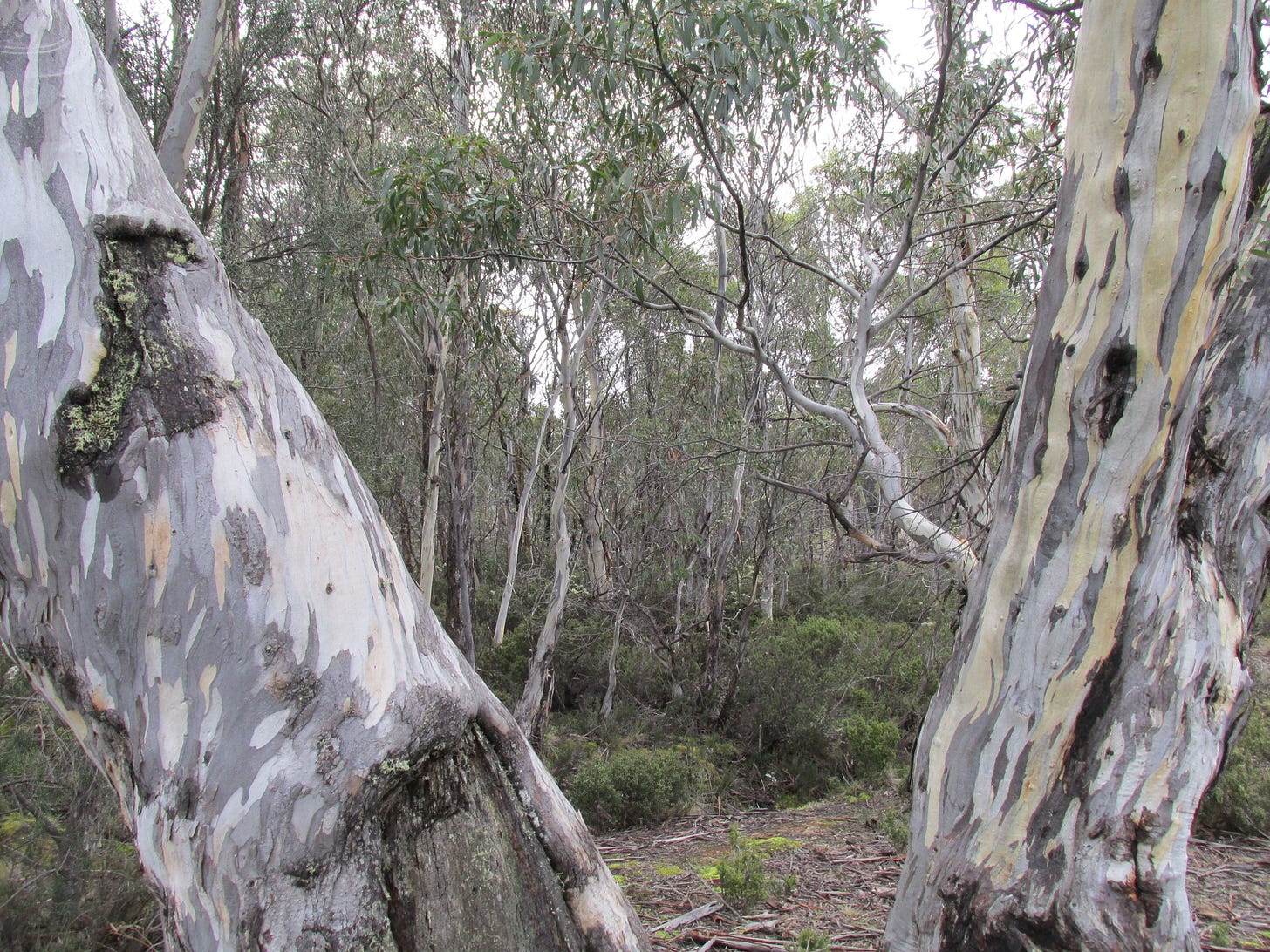Ukiyo...
... for Knots in the String.
I walked in the bush this week.
Such an ordinary thing, you’d think. If I was in the northern hemisphere, I would have said I walked in the forest. And forest implies so much – shady green swathes, gossamer-winged damsel flies sliding down shafts of light, trilling bird song.
On my own far southern island, there are temperate rainforests where mosses carpet the ground and high Dicksonia Antarctica arch over the tracks, fallen ones creating moss- and fern-covered bridges over streams.
But the temperate bush itself is drier, especially this year.
It creaks and bends and great strips of bark cleave from trees and fall with a splinter and crackle. The ground is hard underfoot and in summer, one is alert for tiger snakes (highly venomous). And yet, I walk in the rainforest or on the edge of the dry temperate bush and I’m uplifted by the peace, the birdcall and the isolation. The Japanese called it respectfully, shinrin-yoku (nature-bathing).
There’s something immensely peaceful, even awe-inspiring about walking in a dense forest where the light pierces in small golden spangles through the dancing leaves. Where the breeze rattles disc-like leaves, and ferns wave their fiddlebacks.
Jules Hudson, one of my favourite presenters on Escape to the Country, filmed a walk in the United Kingdom’s Forest of Dean and explained how such walks personally helped him to recover from the pain of grief in his life.
There’s no doubt that nature is nurturing and comforting and I recalled an article I read in The Guardian in 2018, reporting on doctors in the Shetlands who were to begin prescribing nature walks for chronic illness.
The Guardian followed this up recently with a further report on GP’s prescribing of nature walks to restore us in time of physical and mental ill-health. So shinrin-yoku has spread its message from the depths of Japanese society to the western world, but further, has offered something more and perhaps just as powerful.
I first came across the term ikigai when watching Blue Zone on Netflix, the documentary that is a clear guide to living longer with quality of life. Ikigai was a major philosophy in Okinawan society.
Reading more about it, it seems “ Ikigai (ee-key-guy) is a Japanese concept that combines the terms iki, meaning “alive” or “life,” and gai, meaning “benefit” or “worth.” When combined, these terms mean that which gives your life worth, meaning, or purpose. Ikigai is similar to the French term “raison d’etre” or “reason for being.”
I value these kinds of spiritual concepts in my own approach to life. Perhaps age encourages me to make the most of my time, and shinrin-yoku is part of that – a means to my end. In terms of ikigai, I hope I’m one of those folk who always has a reason to get up in the morning.
It’s perhaps most likely to be the personal quest for knowledge – the desire to learn. About my surroundings on sea and land, 12th century history in Europe, embroidery, gardening, farming, cooking, learning to be as good a mother, wife, grandmother and friend that I can be. About ballet and dogs and learning about the way of life of those on Substack…
People like Ramona Grigg, Elizabeth Beggins. And the Godfather of all knowledge, Mike Sowden.
The desire for knowledge – my ikigai.
What’s yours?
Watching:
A short series from the UK called Maryland. A family story - the intricacies of emotions that set a mother on a path and which have cataclysmic ramifications for her family. Set on the Isle of Man, we binged the whole thing and thought it was excellent.
An odd Australian TV series with the inimitable Bryan Brown and Greta Scacchi, called Darby and Joan. It hardly tests one intellectually but it has its good points, specifically Bryan Brown who can turn any sow’s ear into a silk purse. Oh, and the two dogs that played Diesel. And Greta Scacchi who seems to pair quite effortlessly with Bryan Brown. I saw them a couple of years ago in ‘Palm Beach’, a fun Australian movie about my generation, where they played husband and wife so naturally.
So why are we watching Darby and Joan? To support Australian TV and our actors. Why else are we watching? Well, the settings are stunning (people in the northern hemisphere who are surrounded by snow, ice and dark days need this right now!), and the storylines aren’t at all threatening. Would we watch a Series Two if it were commissioned? Actually, yes, even though it’s feather-light.
Finished brilliant Series Two of Muster Dogs. I did shed a bit of a tear when Frank said quietly ‘Lovely dog…’ He’s an icon, is Frank.
Also watching Hugh Fearnley-Whittingstall’s, Hugh’s Wild West. A journey through the natural world of the UK’s west country with all its beautiful idiosyncracies which ties in rather nicely with both ikigai and shrinyin-yoku.
Listening:
The Rumer Godden productions for the BBC that I mentioned last week. Mildly good entertainment for the road and for diversion after a tough week with the terrier (who is trying so hard to get better - 4 more weeks of no beach and swimming! Poor boy.).
Reading:
Too tired to read much and barely writing. Naughty!
Doing:
Attending to the Terrier’s needs, ballet (beautiful music and new movements), walking (see above), stitching for the charity, 1000 Hearts
It’s been such a dreary week in so many ways, not the least of which has been the weather. If we’re in the middle of summer, Hughey (God of all weathers, not just rain in Oz) is surely having the last laugh. We’ve had chilly days (16 Celsius), and a cold wind from the south has been pervasive (inspiring thoughts of bulb planting for spring flowering). The sea’s been grey and choppy with mean wavelets, making swimming unattractive.
Kaisuiyoku is ocean-bathing and apparently not spiritual like it’s sister. But surely it’s as much a thrill to stand on a freezing beach breathing in air that is filled with the enlivening tang of seaweed and fish, letting the water glaze over the toes, reminding one that there’s still time left before autumn leaves begin to colour up, to swim like a mermaid. In its own way, that beach-breathe is as therapeutic as standing in a forest soaking up land-born goodness.
And just to finish, here is another Japanese word – such a gentle idea…
Music choice this week?
I’m quite a fan of Chinese musician, Moyun, and this piece is reminiscent of stream trickle, leaf fall and the whisper of a breeze through the trees – the essence of shinrin- yoku.
Or this, which is Japanese and truly Zen.







A beautiful read, Prue. I found nature to my solace when trekking through the deep undergrowth of grief. How everything seems to make sense when we stand back and see ourselves as part of the bigger picture...and detach ourselves from the bothers of life.💙🙏🏻❄️
Very beautifully written: I could feel myself relaxing just reading it. I never understand people who walk along in tranquil life-giving surroundings like the forest near me or even our local park with their eyes glued to their phone.
Wait: 16 degrees is COOL where you are? That sounds like a heatwave to me.